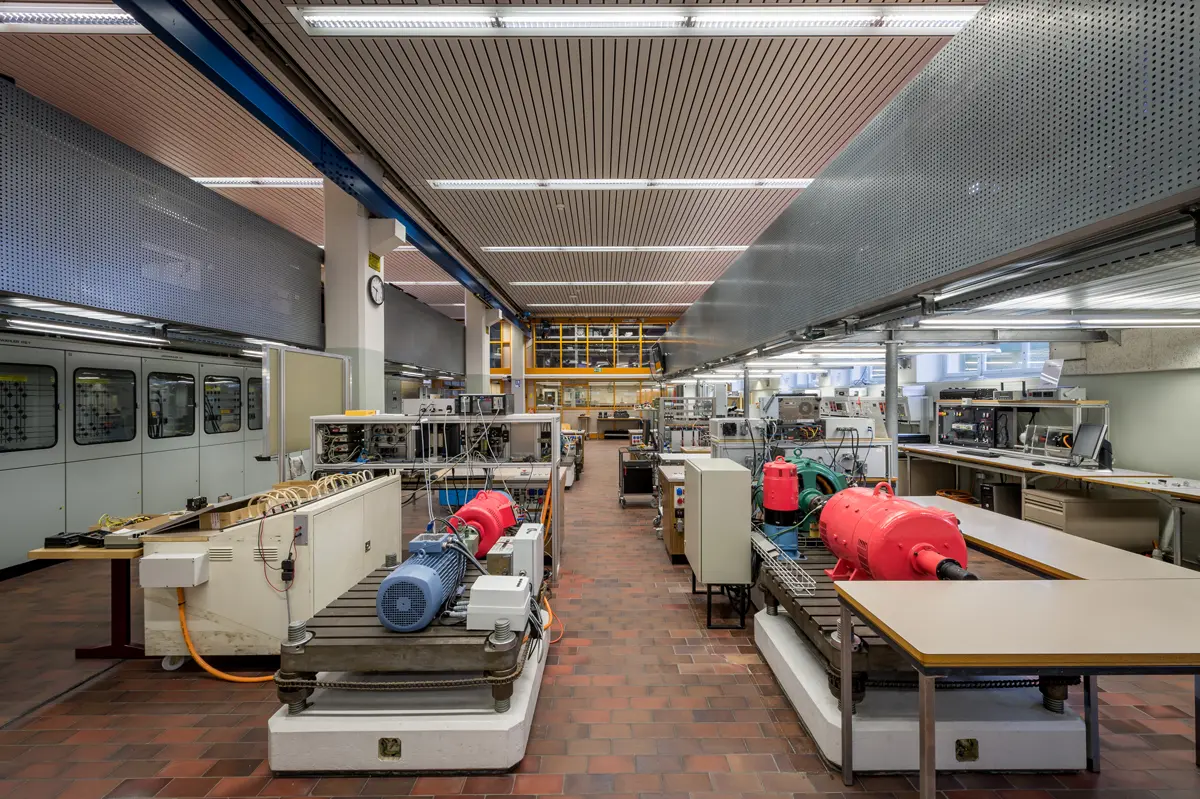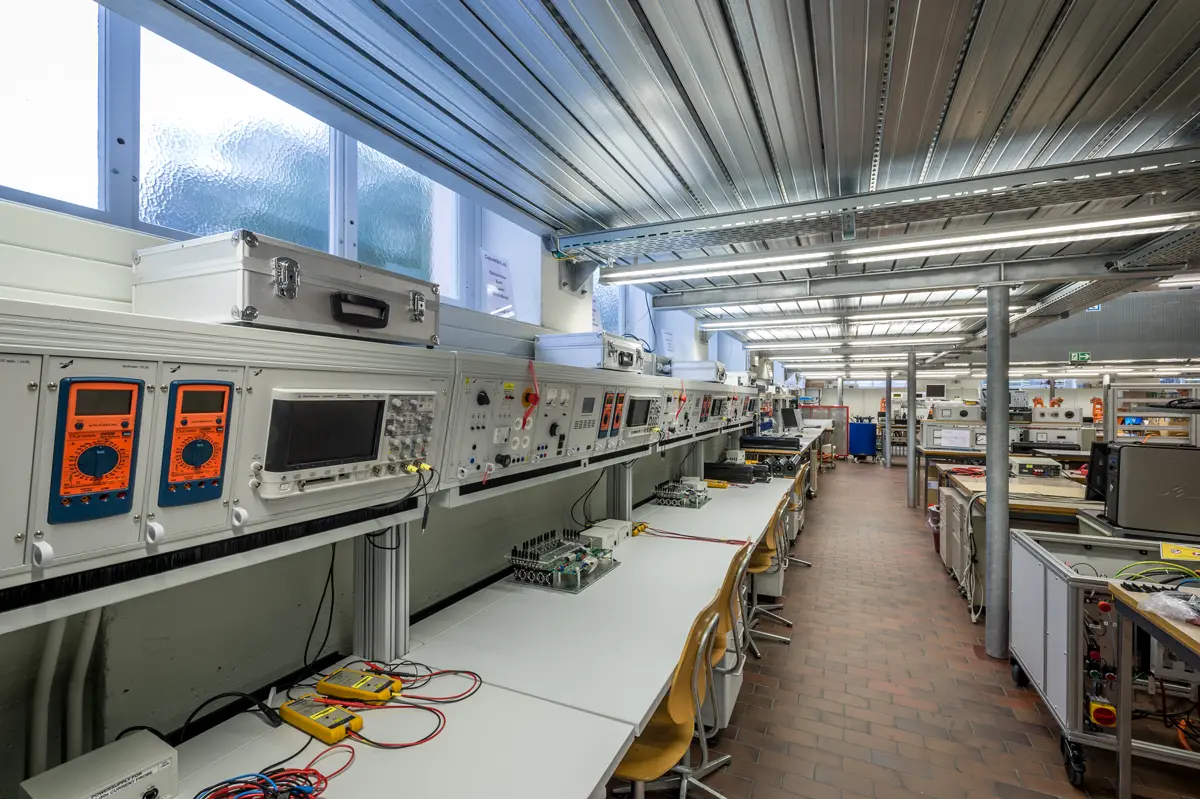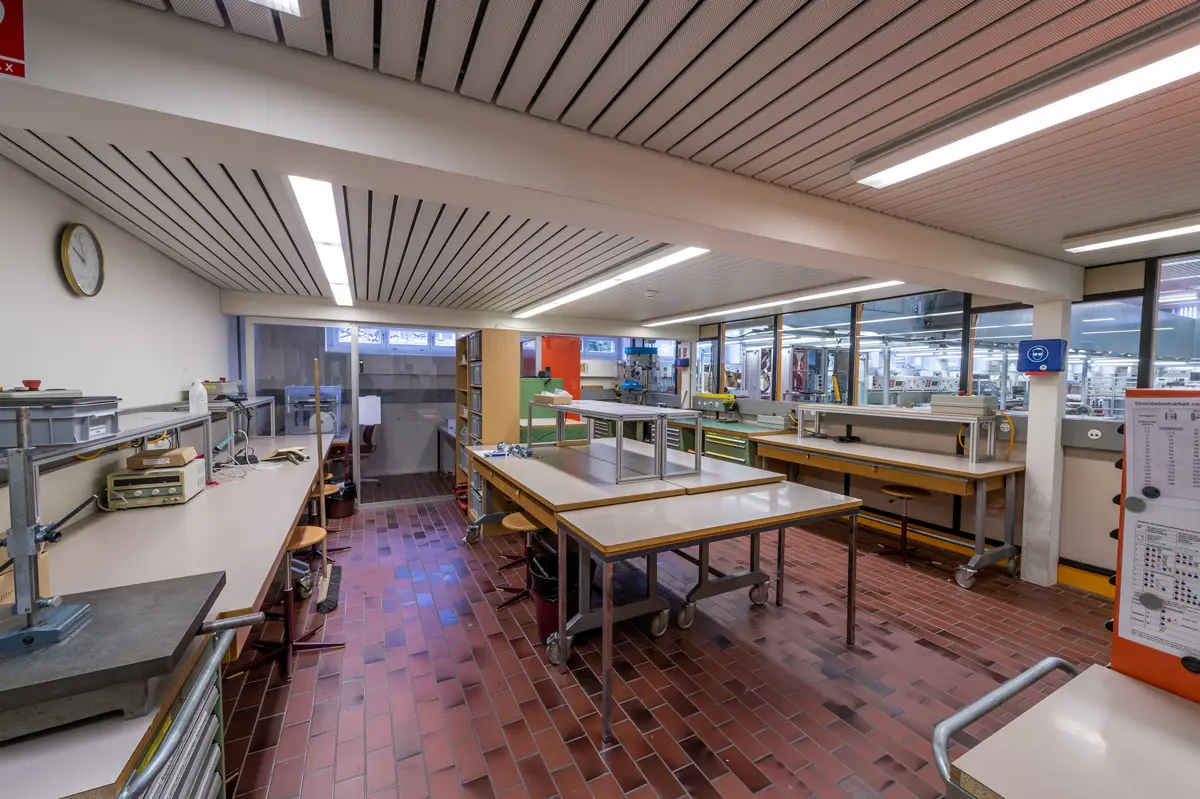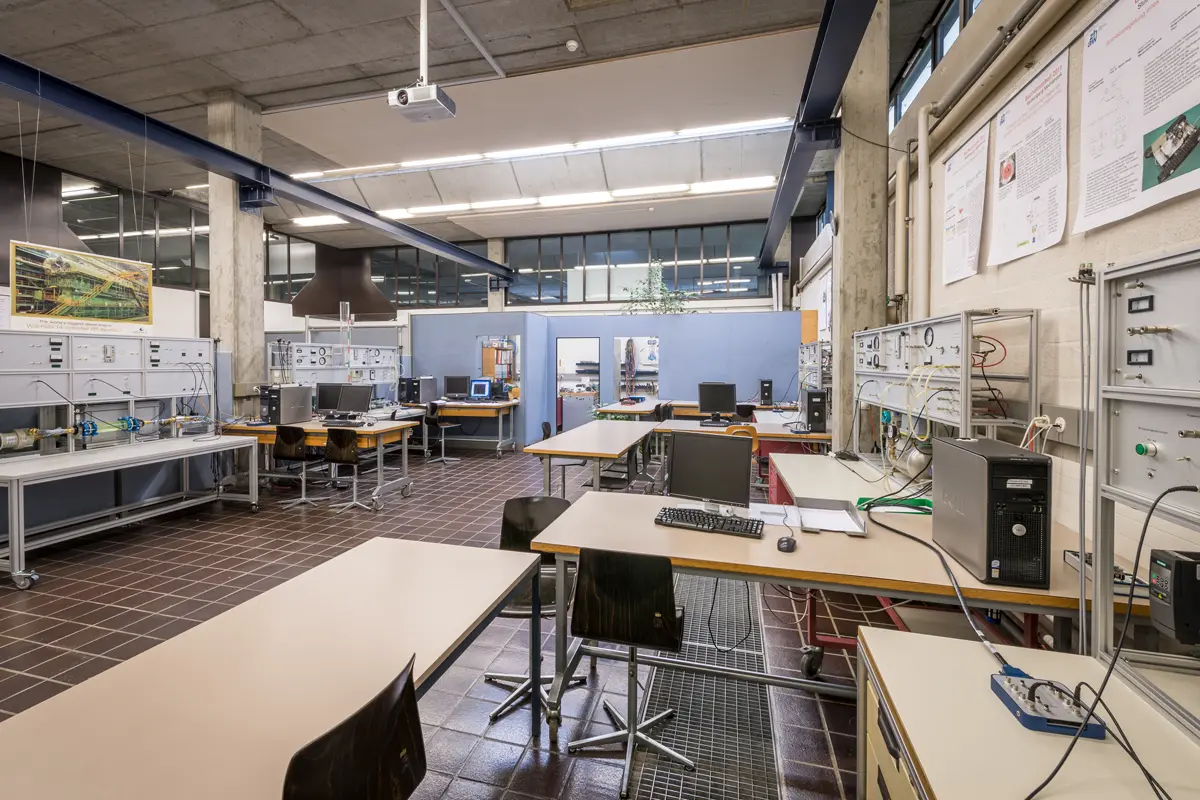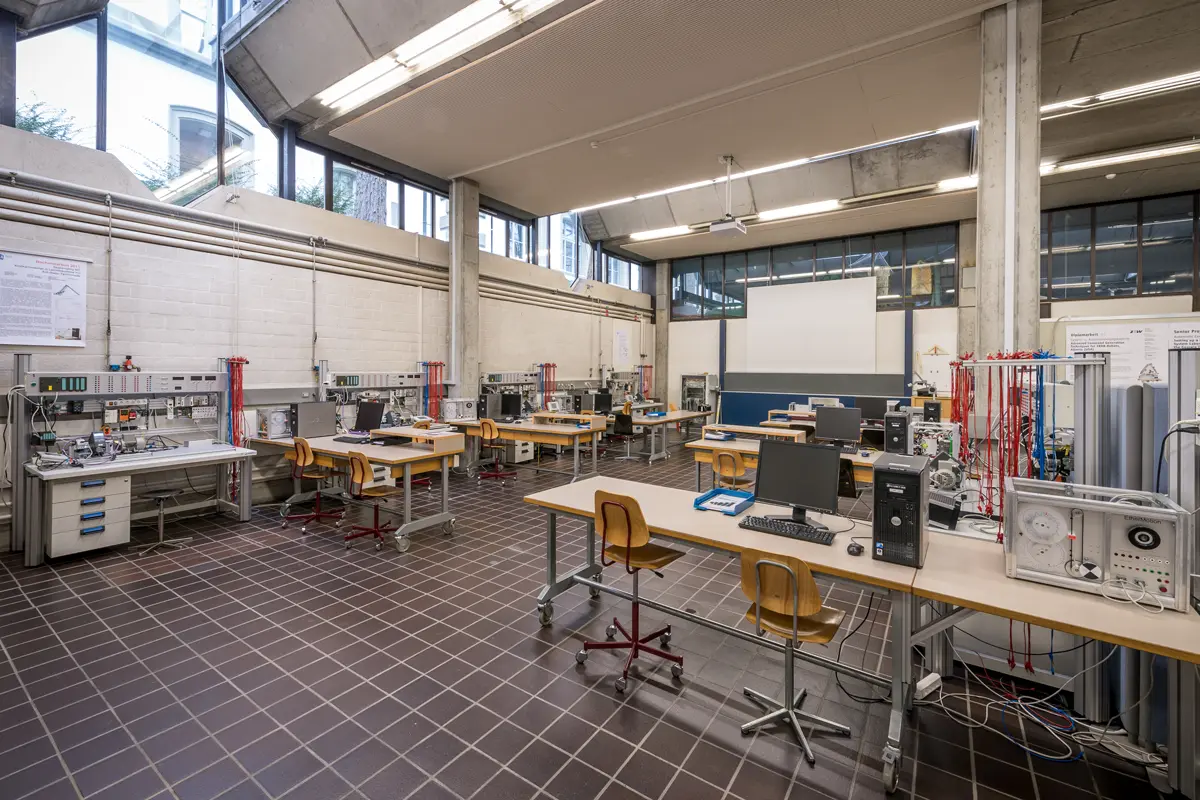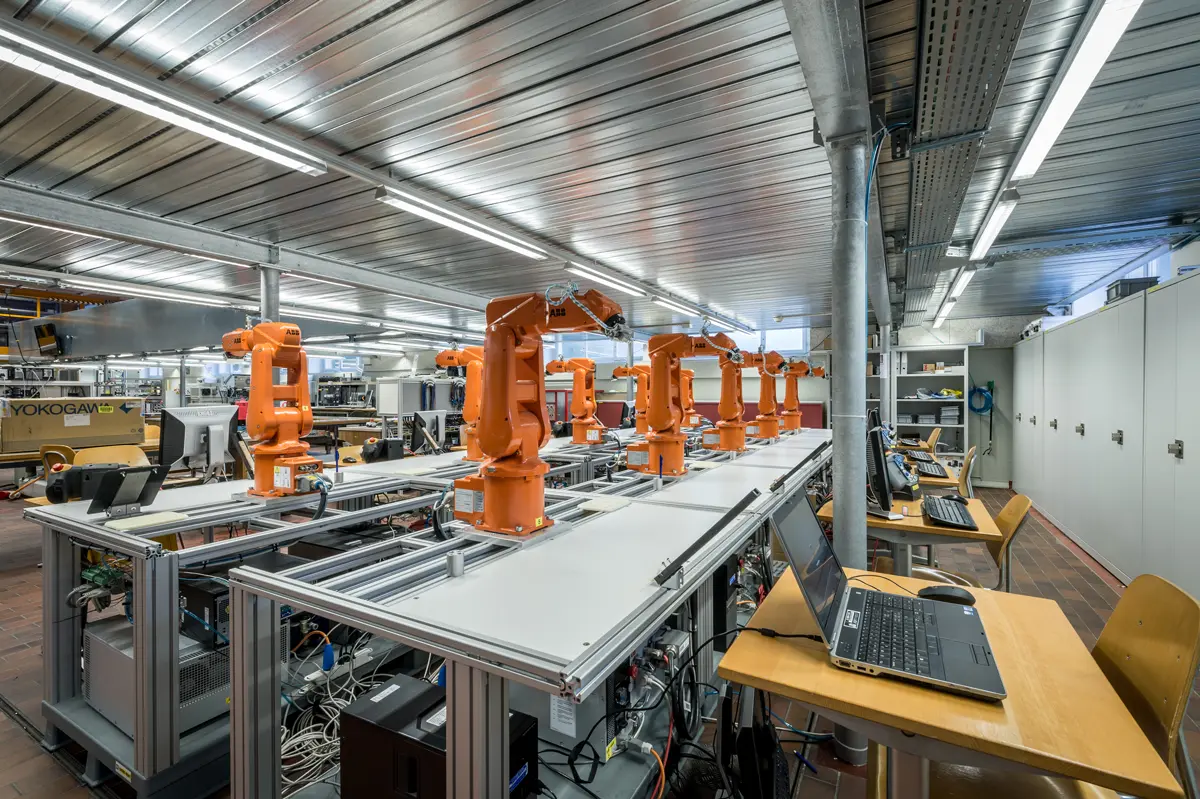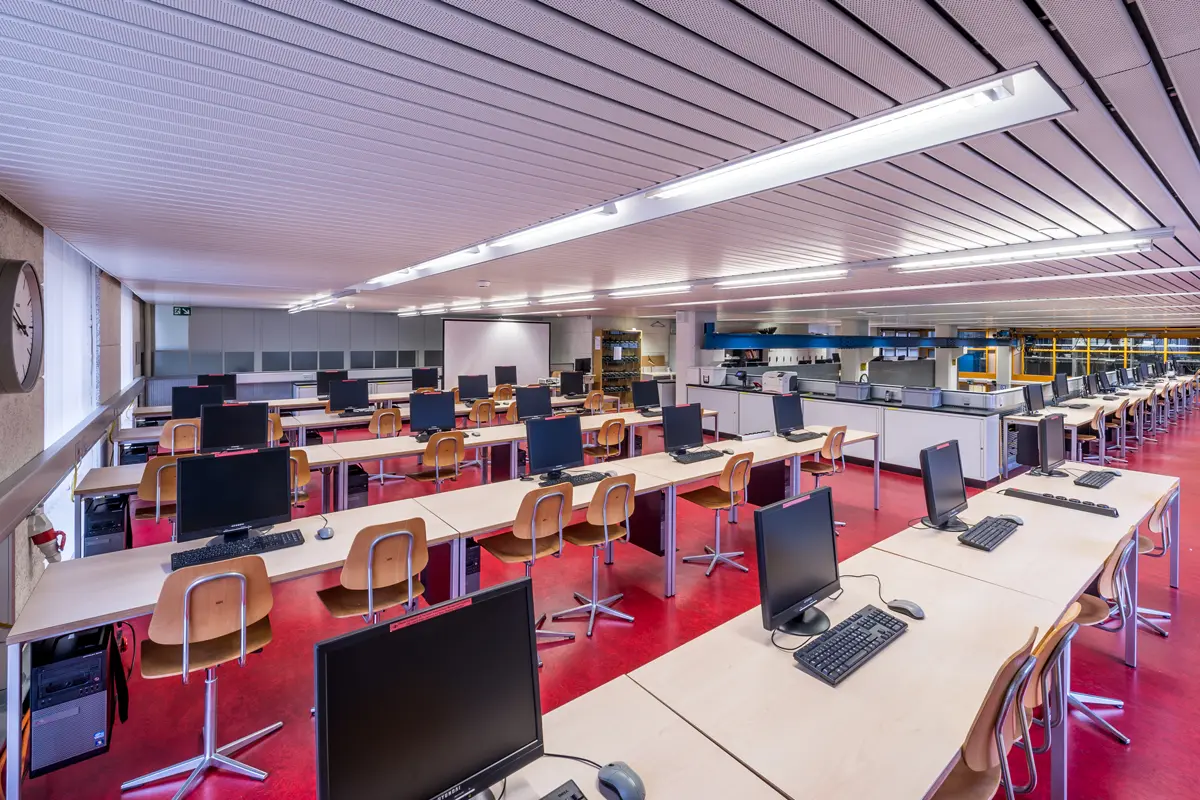Infrastructure
Laboratory for Drive Systems and Power Electronics
In the Laboratory for Drive Systems and Power Electronics (TE 205) the theoretical subjects taught are amplified with practical exercises. It also offers enough space and infrastructure for students’ project and Bachelor theses.
Subject Areas
Based on a solid basic knowledge of electrical engineering course contents are geared to the most important applications of drive engineering and power electronics:
Power Electronics
Power semiconductors, circuits and their properties especially regarding drive engineering, stationary and dynamic behaviour, circuit feedback.
Electrical Drives
Structure, mode of operation, stationary and dynamic behaviour and control of electrical drive systems.
Laboratory Facilities
Workstations with various electrical machines with a power output up to 25 kW and their operation via grid or converter can be used for practical training:
- direct current machines
- asynchronous machine
- synchronous machine
Further workstations have been equipped for experiments with power semiconductors and their circuits. PCs for data collection/protocols and simulation with MATLAB and PLECS are provided for every lab station. All electric variables can be measured in the laboratory with suitable instruments (various Kos and power analyzers, multimeters and so on).
With the workstations comes a workshop with several workspaces (such as soldering). A further thirty workstations, each equipped with a PC, can be used by students for project and Bachelor theses.
Laboratory, Project- and Bachelor Theses
During laboratory students can apply and deepen their classroom knowledge by carrying out experiments. It is important that students do as much as possible themselves (such as drafting test circuits and then connecting all necessary components). Every student has to write a lab journal for every Experiment.
Since the laboratory is subject to the High Voltage Regulation the lab course is under permanent supervision of the tutor responsible and a lab attendant.
For project and Bachelor theses topics as practical as possible are chosen, partly in cooperation with industry partners.
Contact Information
-
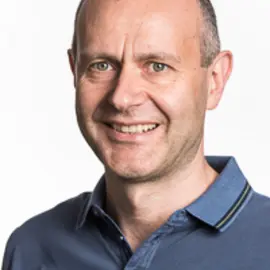
ZHAW School of Engineering
Institute of Mechatronic Systems
Technikumstrasse 9
8400 Winterthur
Laboratory for Automation and Process Measuring and Automatic Control Engineering Systems
The laboratories for Process Measuring and Automatic Control Engineering Systems in rooms TB 143 and TB 145 are used for teaching, lab studies, project theses, Bachelor thesis and Master theses.
Subject Areas
For practical studies and teaching, modern workspaces can be used for the following subjects:
- Process Measuring and Automatic Control Engineering Systems 1&2 (MSRT1 & MSRT2)
- System and Automation Engineering 1&2 (SyAT1 & SyAT 2)
- Automation Engineering1&2 (AU1 & AU2)
Laboratory Facilities
For teaching as well as for research and development projects the following equipment and software are available:
- 6 Workstations with Matlab/Simulink, Stateflow, Real Time Workshop and LabView
- 6 PCs as XPC-Targets for real time applications
- Oscilloscope, signal analyser, signal generator, multimeter
- 5 Workstations: 2x fluid level control system, 2x pressure control, 1x drive control
- Various models for control engineering class: flywheel simulation, caterpillars, solar panel, fiber friction test, pressure control velve
- 8 workstations with Simatic automation devices S7 with CPU 315F-2 PN/DP, ET 200S, ASi-Link and TP177
- SPS-Software Simatic Step7 incl. PLCSim, S7-Graph, WinCCflexible, SCL, CFC and Simit
- Simotion automatision devices D425 and D435 with Sinamics CU120, M440
- Motion Control Software Simotion Scout
- Building automation and distributed intelligence with LON (Local Operating Network)
R&D Projects, Master theses, Bachelor Theses, Project Theses
Projects in the following areas are undertaken in the laboratories for automation and Process Measuring and Automatic Control Engineering Systems:
- Planning and designing the automatisation of facilities and machines
- Feasibility study for Motion control applications
- Simulation of machines and facilities for testing of S7 SPS programmes
- Consulting in machinery safety and facility safety
- Modelling and simulation of machines and facilities for model-based design of control devices
- Rapid-prototyping of control devices
- Designing and optimizing the dynamic behaviour of power units
Contact Information
-

ZHAW School of Engineering
Institute of Mechatronic Systems
Technikumstrasse 9
8400 Winterthur
Laboratory for Robotics and Mechatronics
The laboratory for Robotics and Mechatronics can be found in Room TS O4.50. Undertaking practical exercises students deepen their theoretical knowledge in robotics and mechatronics. At the same time the laboratory offers workspaces and infrastructure for project theses and Bachelor theses.
Subject Areas
Based on a basic knowledge of mathematics, physics, computer science, electrical engineering and mechanical engineering, the practical work in the lab for robotics and mechatronics focuses especially on the following areas:
Kinematics and Kinetics
- Tensor calculation, equation of motion, transformation of coordinates, multijoint mechanisms
Robot Dynamics
- Fundamental terms and designs, time optimised control
- Sensor technology
- Distance measurement, power measurement, torque measurement, tactile sensors
- Image processing
- Digitisation of images, edge detection, extraction of characteristics, recognition of patterns
Software Tools
- Simulation, draft project planning, calculation, documentation
Lab Equipment
For both course work and students‘ projects 10 ABB IRB120-robots with PC-workplaces are available in the Robotic Lab. Furthermore the lab owns more than 11 FESTO Robotinos as well as 20 LEGO NXT Bricks. These different systems allow students to put theory (programming, sensoric, control, and so on) into action while solving various exercises.
Practical, Project Theses and Bachelor Theses
Deepening theory is combined with concrete, practical exercises (such as palletising and autonomous navigation) during practical as well as project theses and Bachelor theses. When planning and realizing project theses and bachelor theses emphasis is put on the cooperation with industry partners to offer students practical topics and tasks.
Contact
-
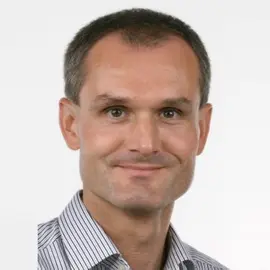
ZHAW School of Engineering
Institute of Mechatronic Systems
Technikumstrasse 9
8400 Winterthur
